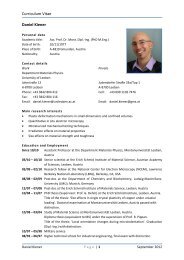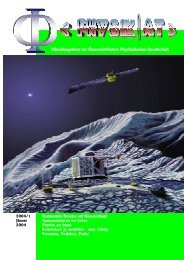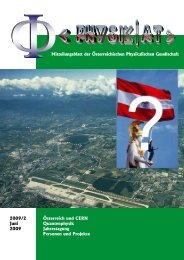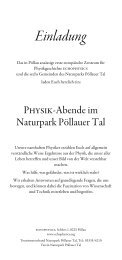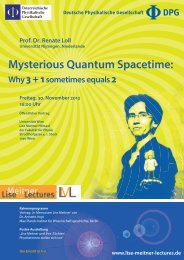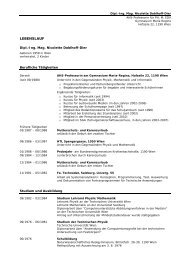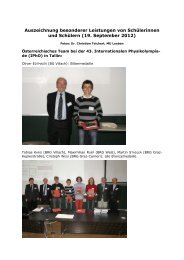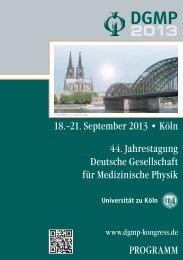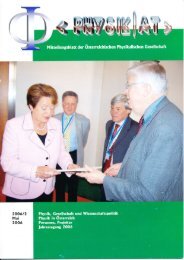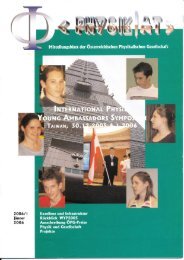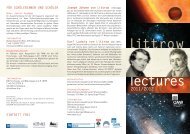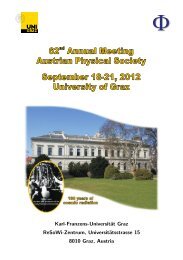Physik uNd gesellschAfT - Austrian Physical Society
Physik uNd gesellschAfT - Austrian Physical Society
Physik uNd gesellschAfT - Austrian Physical Society
Erfolgreiche ePaper selbst erstellen
Machen Sie aus Ihren PDF Publikationen ein blätterbares Flipbook mit unserer einzigartigen Google optimierten e-Paper Software.
<strong>Physik</strong> und Gesellschaft<br />
• Science and ethics<br />
36 participants from 15 countries participated<br />
in two days of group work. The<br />
three topics were initiated by three distinguished<br />
keynote speakers. Katherine<br />
Richardson, Vice Dean (Outreach), Faculty<br />
of Natural Sciences, Copenhagen<br />
University was keynote speaker in the<br />
first topic, education and scientific literacy.<br />
She gave a sharp analysis of the<br />
physics culture based on her own experience<br />
as a marine ecologist, a research<br />
field central to outstanding problems<br />
facing society today. With this starting<br />
point Katherine Richardson stressed<br />
the increasingly more interdisciplinary<br />
character of modern science and continued<br />
with an analysis of the need for<br />
physics to better understand this shift<br />
in nature of important problems both in<br />
science itself and in society.<br />
Pierre Léna, professor in astrophysics<br />
at University Denis-Diderot (Paris 7) and<br />
‘Délégué à l’Éducation et à la Formation’<br />
of the French ‘Académie des Sciences’<br />
was the second keynote speaker<br />
on the topic of education and scientific<br />
literacy. He has, for the last 10 years<br />
worked with physics education within a<br />
major French initiative on primary and<br />
secondary science teaching, La Main à<br />
la Pâte. With this starting point, he gave<br />
a lucid analysis of the present elementary<br />
educational practices and pointed<br />
to the need for reforms. He discussed<br />
inquiry based learning practices and<br />
referred to extensive progress made in<br />
France. This presentation raised, as did<br />
also the first keynote, a vivid discussion<br />
on the present dire situation of physics<br />
education in Europe.<br />
Krishna Nathan, an astronomer turned<br />
IBM-executive was keynote speaker<br />
on the second workshop theme, that<br />
of creativity and innovation. Based on<br />
his extensive experience from IBM he<br />
decisively showed how innovation was<br />
developed into a direct tool for the creation<br />
of new products and services. He<br />
then projected this experience onto the<br />
academic world and showed how the<br />
concepts of creativity and innovation<br />
are universal and not restricted to specific<br />
businesses.<br />
Vagn Lundsgaard Hansen, a mathematics<br />
professor at the Technical University<br />
of Denmark and a member of the Danish<br />
Committee on scientific dishonesty<br />
was keynote speaker on the third workshop<br />
topic, science and ethics. He gave<br />
a careful presentation of the topics to<br />
16 Nr. 4/2007<br />
be considered in maintaining integrity<br />
and honesty in scientific work. He also<br />
stressed the need for ethics to be fully<br />
and better integrated in scientific work<br />
than is the case today.<br />
SUMMARY OF VISIONS &<br />
RECOMMENDATIONS<br />
The working groups worked within the<br />
same frame in order for the recommendations<br />
to be easily adopted by EPS as<br />
well as its national member societies<br />
and other relevant bodies.<br />
SCIENCE EDUCATION AND SCI-<br />
ENTIFIC LITERACY<br />
The vision for the work was: Since science<br />
is a key to intellectual and economic<br />
development we need to guarantee<br />
an appropriate science education on all<br />
levels.<br />
Three recommendations were<br />
expressed<br />
1. Improving science education at all<br />
levels is one of the principal responsibilities<br />
of the physics community which<br />
includes teachers at all levels as well<br />
as physicists at universities, research<br />
institutions and industries.<br />
2. European funding for pilot projects in<br />
science and physics education as well<br />
as for the dissemination and adaptation<br />
of good practise examples should be<br />
increased significantly.<br />
3. A vital element in improving science<br />
education is increased public recognition<br />
of teachers and an improvement<br />
of their professional development reflected<br />
in their career.<br />
CREATIVITY AND INNOVATION<br />
The challenges and visions for the<br />
work were, supporting creativity, changing<br />
culture and simplifying processes.<br />
Three recommendations were<br />
expressed<br />
1. To resolve the EU Innovation Paradox<br />
we need to create a culture of risk<br />
taking within the science community by<br />
including entrepreneurship skills in the<br />
higher education curriculum. Appropriate<br />
support services, such as advice on<br />
financial, management and intellectual<br />
property matters, must be provided in<br />
parallel.<br />
2. Improve the environment for learning<br />
and creative thinking. This can be done,<br />
for example, by generating a positive<br />
image of science in the media, by encouraging<br />
the dialog between teachers<br />
and researchers, by using science museums<br />
as an additional resource in education,<br />
and by including architectural<br />
and art elements related to science in<br />
schools and public spaces.<br />
3. Identify the procedures to simplify the<br />
transfer of ideas and visions into reality.<br />
This will accelerate innovation and enhance<br />
the creation of economic value.<br />
SCIENCE AND ETHICS<br />
The challenges and visions for the<br />
work were, to have all physicists following<br />
codes of conduct and ethical<br />
guidelines and the public appreciating<br />
ethical issues in physics-related topics.<br />
Four recommendations were<br />
expressed<br />
1. EPS should prepare a code of ethical<br />
conduct covering the prohibition of<br />
fabrication, falsification and plagiarism<br />
of results etc., with a recommendation<br />
that this be adopted by its Member<br />
Societies.<br />
2. EPS should also consider aspects of<br />
questionable practice in research and<br />
other professional domains and provide<br />
appropriate guidelines.<br />
3. In addition EPS should produce ethical<br />
guidelines requiring physicists to<br />
consider the ethical implications of their<br />
work (particularly R&D) and to act according<br />
to their consciences. Physicists<br />
should be encouraged to bring forward<br />
for application results of fundamental<br />
research when it appears it would benefit<br />
society, but on the other hand not<br />
knowingly to overstate the expected<br />
benefits of particular lines of research.<br />
4. EPS should develop a strategy for<br />
public appreciation of ethical issues in<br />
physics-related topics, including its applications<br />
in the life sciences and environmental<br />
issues.<br />
EPS TASKS AND ACTIONS<br />
The European <strong>Physical</strong> <strong>Society</strong> (EPS)<br />
should review these recommendations<br />
and if appropriate, update its position<br />
papers on Education2 and Ethical<br />
conduct3.<br />
The European <strong>Physical</strong> <strong>Society</strong> (EPS)<br />
should review the recommendations on<br />
Creativity and Innovation and consider<br />
their implication on its position paper on<br />
Brain Drain, a topic related to creativity<br />
and innovation.



